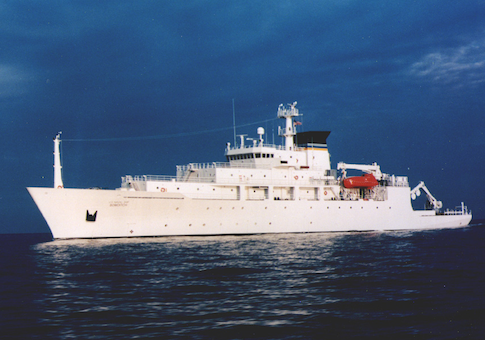A Chinese navy ship seized an American unmanned undersea vehicle in international waters in the South China Sea on Thursday, leading U.S. officials to demand its return.
The Pentagon confirmed the incident on Friday, which comes amid heightened tensions in the South China Sea. The Chinese warship seized the underwater vehicle deployed by the USNS Bowditch, a U.S. oceanographic ship, on Dec. 15.
Pentagon press secretary Peter Cook confirmed the incident in a statement, saying that the Defense Department had called on China to immediately return the unmanned underwater vehicle that it "unlawfully seized" northwest of Subic Bay in the South China Sea. The undersea vehicle was conducting unclassified operations in international waters, he said.
"The USNS Bowditch (T-AGS 62) and the UUV–an unclassified 'ocean glider' system used around the world to gather military oceanographic data such as salinity, water temperature, and sound speed–were conducting routine operations in accordance with international law about 50 nautical miles northwest of Subic Bay, Philippines, when a Chinese Navy PRC DALANG III-Class ship (ASR-510) launched a small boat and retrieved the UUV," Cook said.
"Bowditch made contact with the PRC Navy ship via bridge-to-bridge radio to request the return of the UUV. The radio contact was acknowledged by the PRC Navy ship, but the request was ignored," Cook said. "The UUV is a sovereign immune vessel of the United States. We call upon China to return our UUV immediately, and to comply with all of its obligations under international law."
A senior military official said the drone taken by the Chinese submarine rescue ship was an unpowered glider that contains no secrets. However, the Navy regards the drone as an American naval vessel that should be afforded all protections for ships operating in international waters. The military official said the Chinese action was theft.
As of Friday afternoon, there was no response from the Chinese military to Pentagon demands that the glider be returned. The incident occurred north of Subic Bay, Philippines as the Bowditch was making routine sea surveys used in underwater operations.
Pentagon intelligence agencies are assessing whether the incident was a deliberate provocation or an action taken independently of higher military authorities--something that is considered very unlikely based on tight, top-down Chinese military command controls on activities.
CNN reported that the underwater drone was seized by the Chinese vessel right before the eyes of the crew of the USNS Bowditch. The American vessel had stopped in the water to collect two underwater vehicles, when crew members of the Chinese navy ship put a small boat in the water and came up alongside the U.S. ship and took one of the drones.
China, which claims most of the South China Sea as its territory, has been building on artificial islands in the region in what U.S. officials have described as efforts to militarize the region. China has also ignored a ruling by an international tribunal this summer that concluded Beijing's claims in the South China Sea have no legal or historical basis.
U.S. warships have repeatedly sailed close to islands and features claimed by China in the South China Sea in recent months, in exercise of their freedom to navigate through international waters. The moves have drawn ire from Beijing.
On Thursday, China appeared to acknowledge that it had deployed weapons to features in the Spratly island chain, after a U.S. foreign policy think tank released an analysis indicating that Beijing had installed anti-aircraft and anti-missile systems on seven of its manmade islands.
"The deployment of necessary military facilities that will be mainly used for defense and self-defense purposes is legitimate," the Ministry of National Defense of the People's Republic of China said in a statement. "For instance, if anyone flexes muscle in front of your house, shouldn’t you prepare a bow and arrow?"
The bold drone seizure comes amid increasing tensions between the United States and China over recent statements by President-elect Donald Trump questioning Beijing's policy toward Taiwan. Trump was the first senior U.S. civilian leader to speak directly by phone with a Taiwanese leaders during a phone call from Taiwan President Tsai Ing-wen recently.
This post will be updated as further information becomes available.
